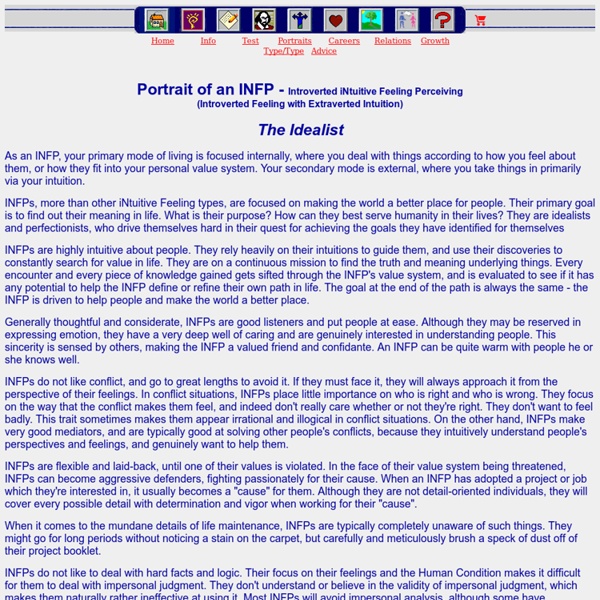Daniel Smith
I believe that people are mostly at different levels of awareness or consciousness in their lives and that we look at life through our own set of glasses. Most of us are functioning based on ideas and theories that have been passed on from generation to generation and so we are seeing the world through our ideas and not necessarily looking at reality. As a species we have advanced tremendously in technology and commerce, but one thing we have neglected to advance in is consciousness, the ability to be awake in the world.
INFP Personality Types - overview
Each letter in the personality type code - I, N, F, and P - describes a preference for a way of thinking or behaving. There are eight styles and you use all of them, but INFPs prefer: Introversion (thinking things through) more than Extraversion (interacting with people)iNtuition (perceiving new possibilities) more than Sensing (perceiving tangible facts)Feeling (making decisions using subjective values) more than Thinking (making decisions using objective logic)Perception (a flexible lifestyle) more than Judgement (an organised lifestyle) Find out how close your unique personality is to INFP.
Extroversion and introversion
The trait of extraversion–introversion is a central dimension of human personality theories. The terms introversion and extraversion were first popularized by Carl Jung,[1] Although both the popular understanding and psychological age differ from his original intent. Extraversion tends to be manifested in outgoing, talkative, energetic behavior, whereas introversion is manifested in more reserved and solitary behavior.[2] Virtually all comprehensive models of personality include these concepts in various forms. Examples include the Big Five model, Jung's analytical psychology, Hans Eysenck's three-factor model, Raymond Cattell's 16 personality factors, the Minnesota Multiphasic Personality Inventory, and the Myers–Briggs Type Indicator. In any case, people fluctuate in their behavior all the time, and even extreme introverts and extroverts do not always act according to their type.
10 Most Brilliant Social Psychology Experiments
Ten of the most influential social psychology experiments. “I have been primarily interested in how and why ordinary people do unusual things, things that seem alien to their natures.Why do good people sometimes act evil?Why do smart people sometimes do dumb or irrational things?” –Philip Zimbardo Like eminent social psychologist Professor Philip Zimbardo (author of The Lucifer Effect: Understanding How Good People Turn Evil), I’m also obsessed with why we do dumb or irrational things.
The INFP in Life, Work, and Love - A Personality Type Profile
Recognizing an INFP INFPs may initially seem cool, as they reserve their most authentic thoughts and feelings for people they know well. They are reflective and often spiritual, and often interested in having meaningful conversations about values, ethics, people, and personal growth.
Two-factor models of personality
Beginnings[edit] The Roman physician Galen mapped the four temperaments (sanguine, phlegmatic, choleric and melancholic) to a matrix of hot/cold and dry/wet, taken from the four classical elements.[1] Two of these temperaments, sanguine and choleric, shared a common trait: quickness of response (corresponding to "heat"), while the melancholic and phlegmatic shared the opposite, a longer response (coldness). The melancholic and choleric, however, shared a sustained response (dryness), and the sanguine and phlegmatic shared a short-lived response (wetness). This meant that the choleric and melancholic both would tend to hang on to emotions like anger, and thus appear more serious and critical than the fun-loving sanguine, and the peaceful phlegmatic. However, the choleric would be characterized by quick expressions of anger (like the sanguine, with the difference being that the sanguine cools off); while the melancholic would build up anger slowly, silently, before exploding.
William James
Be not afraid of life. Believe that life is worth living, and your belief will help create the fact. William James (11 January 1842 – 26 August 1910) was a pioneering American psychologist and philosopher.
INFP Profile
Introverted iNtuitive Feeling Perceiving by Joe Butt Profile: INFP Revision: 3.0 Date of Revision: 26 Feb 2005 "I remember the first albatross I ever saw. ...
William Schutz
William Schutz (December 19, 1925 – November 9, 2002) was an American psychologist.[1][2] In 1958, Schutz introduced a theory of interpersonal relations he called Fundamental Interpersonal Relations Orientation (FIRO). According to the theory three dimensions of interpersonal relations were deemed to be necessary and sufficient to explain most human interaction: Inclusion, Control and Affection. These dimensions have been used to assess group dynamics.
5 Brainwashing Tricks That Work No Matter How Smart You Are
#2. Everyone Has the Same Moral Code, They Just Use It Differently Win McNamee/Getty Images News/Getty Images Question: Do you consider yourself morally superior to the people who used to burn witches (and in fact, still do)? I would certainly hope so -- these people are kidnapping innocent men and women and executing them based on a ridiculous superstition.
infp Companion
This is a mind map made during and after one of my own flips. My very judgmental and demanding thoughts are on the right side of the map, and to the left are my thoughts as I come back into myself. A few of you wanted to know a more about this map, so here are more of my thoughts about it.



